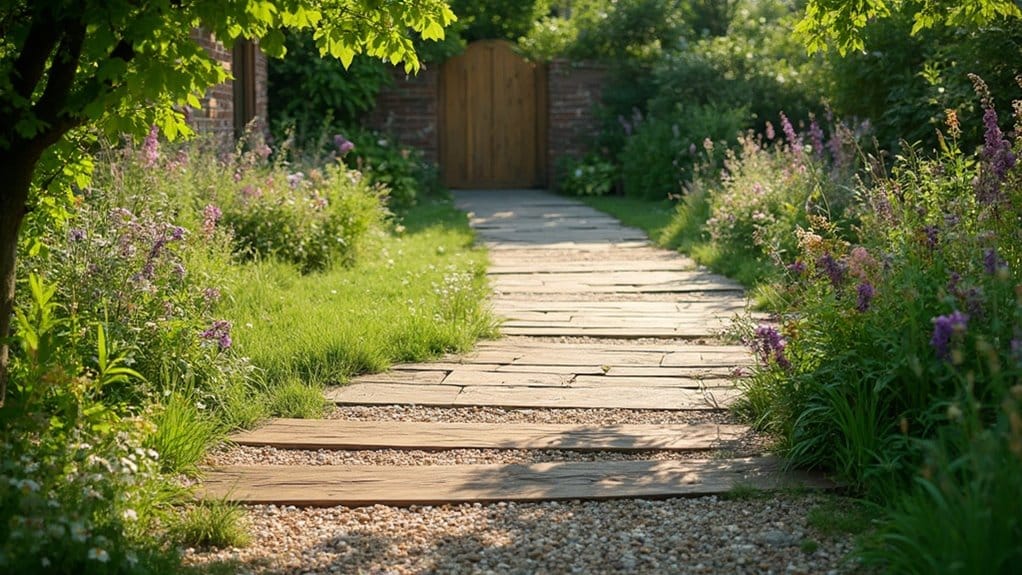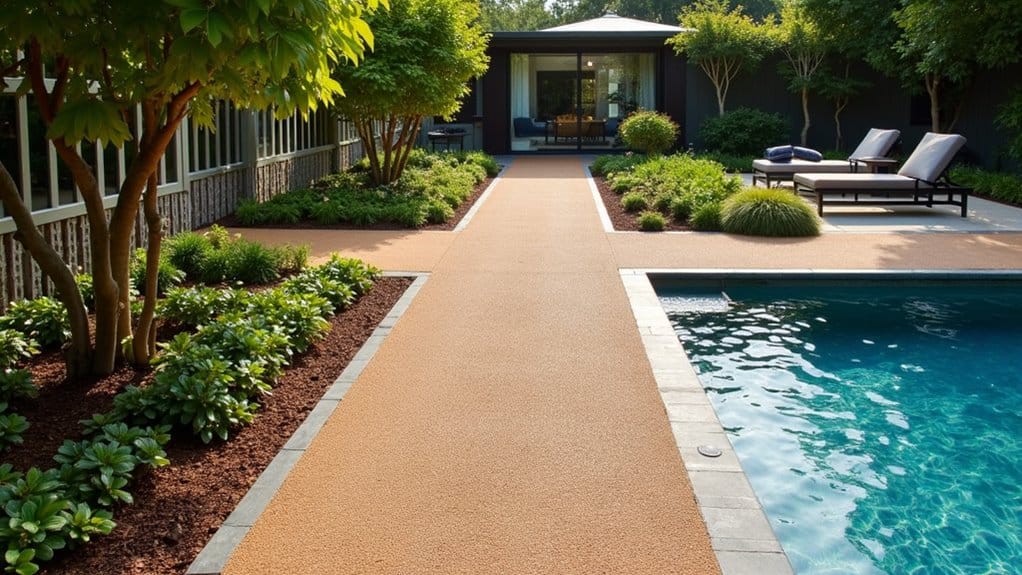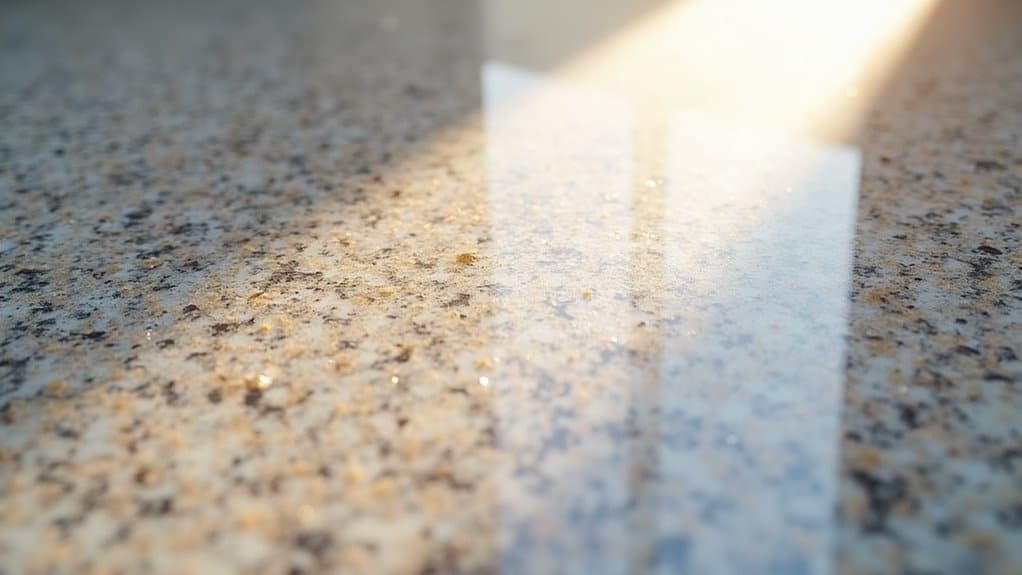If you're considering alternatives to tarmac driveways, there are several options available. Gravel driveways are cost-effective and straightforward to install. For a more traditional look, brick and cobblestone provide durability and charm. If you're environmentally conscious, permeable pavers help reduce water runoff. For a distinctive appearance, tar and chip driveways combine gravel with asphalt, offering good traction and low maintenance. Each option has its benefits, so take the time to explore these alternatives.
Table of Contents
ToggleKey Takeaways
- Gravel driveways are a cost-effective and straightforward choice, boasting excellent drainage capabilities.
- Permeable paver driveways help reduce runoff and encourage groundwater recharge, all while offering a variety of design options.
- Tar and chip driveways deliver durability and traction with minimal upkeep and a distinctive look.
- Brick driveways can boost your property's value with their traditional aesthetic and can handle substantial vehicle traffic.
- Cobblestone driveways offer a rustic charm and timeless elegance, but they do require regular maintenance to keep them looking their best.
Cost-Effectiveness of Driveway Alternatives
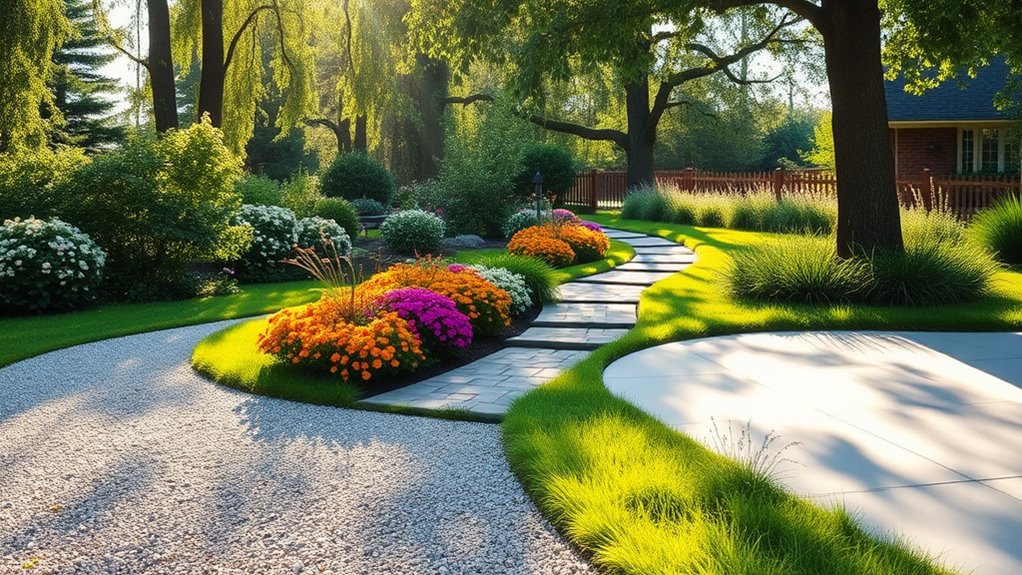
When exploring driveway alternatives, it's important to assess their cost-effectiveness in relation to your budget and future needs.
A detailed cost analysis shows a range of options. Gravel driveways are the most affordable, costing between £1 and £1.50 per square foot, while tar and chip driveways typically range from £4 to £8. Although concrete has a higher upfront cost, its durability often makes it more economical in the long run due to lower maintenance needs. Moreover, using recycled materials can save money and align with current sustainability trends. Durability is a crucial aspect to consider, as selecting materials that withstand wear and tear can impact long-term maintenance costs. Additionally, some materials like tarmac driveways are durable for heavy vehicles but may require regular sealing and repairs.
Remember that some options may require regular upkeep, but investing in stone or brick can enhance your property's value, justifying the initial expenditure with potential long-term gains.
Durability Comparison of Driveway Materials
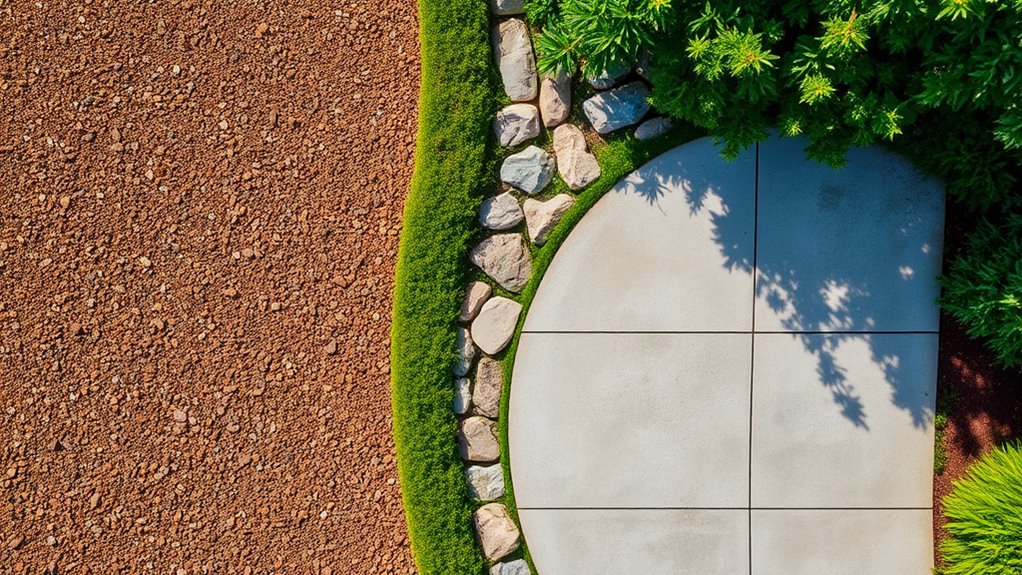
When selecting a driveway material, consider its durability, resistance to weather, and maintenance needs.
For instance, concrete can last for decades but may crack under extreme conditions. In contrast, cobblestones are highly durable and require little maintenance. Cobblestone pavers can last up to a century when laid properly, making them an excellent long-term investment. Additionally, resin driveways are known for their exceptional durability and can last 15-25 years with proper maintenance.
Material Longevity Assessment
When choosing a driveway, it's important to consider the longevity of different materials, as this affects maintenance costs and overall value. Asphalt typically lasts 12 to 20 years, making it a cost-effective option. In contrast, concrete can last 25 to 50 years with proper maintenance. Cobblestone is particularly durable, lasting up to a century with minimal upkeep. Interlocking pavers can last over 40 years, while brick typically lasts around 25 years, especially in favourable climates. Each material's lifespan highlights the relationship between initial investment, durability, and maintenance. Selecting the right option not only impacts your budget but also enhances your property's attractiveness for years to come. Additionally, asphalt's recyclability contributes to its long-term value by reducing waste. Moreover, tarmac driveways are known for their durability and can exceed 25 years with proper care.
Weather Resistance Factors
When considering the longevity of driveway materials, weather resistance is crucial. Different materials respond uniquely to various climate conditions.
Asphalt is cost-effective but can crack in freezing temperatures. Concrete is robust but requires proper sealing to endure freeze-thaw cycles. Pavers are excellent for weather resistance due to their interlocking design, although they may experience joint erosion over time.
Gravel offers good drainage but can be displaced during heavy rain. In humid regions, plastic grids filled with gravel can improve stability and durability.
Ultimately, selecting the right driveway material means assessing its suitability for your local weather conditions.
Maintenance Frequency Comparison
Choosing the right driveway material is about more than just looks; it also depends on the maintenance you'll need to carry out over time.
Asphalt driveways require sealing every 2-3 years to keep them in good condition, while concrete should be sealed based on its appearance or any damage. Both materials benefit from quick crack repairs to prevent further issues.
Asphalt may need resurfacing occasionally, which can be a cost-effective way to extend its lifespan, typically ranging from 15-20 years. In comparison, concrete lasts longer, often 20-30 years, and generally has lower maintenance needs.
Regular inspections are key to spotting maintenance issues early. By using proper sealing methods and addressing cracks promptly, you can improve your driveway's durability and appearance while keeping long-term costs down.
Environmental Impact of Different Options
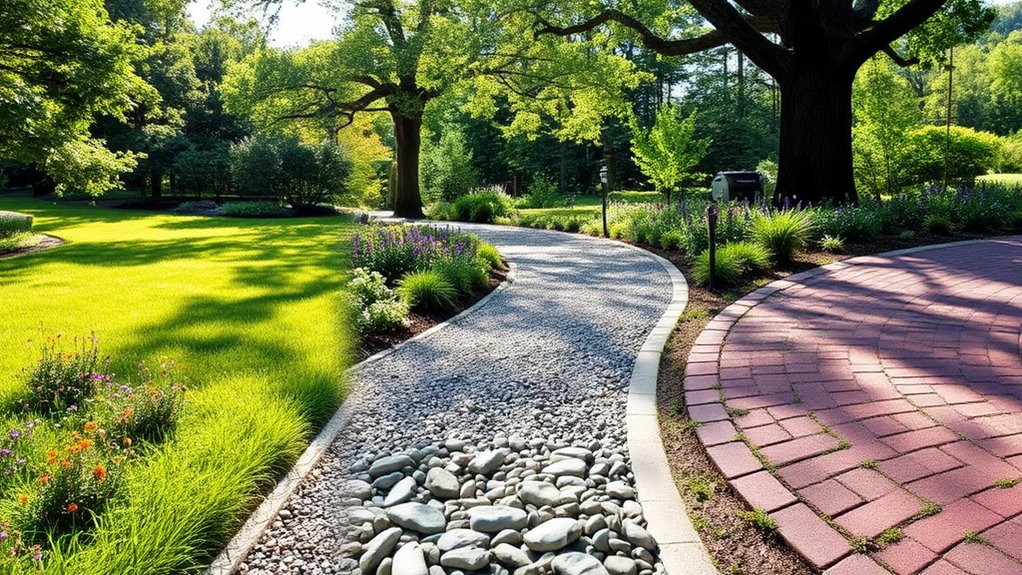
When considering driveway options, it's important to assess their environmental impact, which varies significantly between materials. Traditional choices like asphalt and concrete are major contributors to CO₂ emissions and stormwater runoff, which can damage local ecosystems.
On the other hand, eco-friendly materials such as permeable pavers and recycled asphalt help reduce runoff and encourage groundwater recharge. Low-carbon concrete and recycled concrete also minimise waste and resource use, tackling landfill issues effectively.
Grass driveways with grids not only manage water well but also boost local biodiversity.
Aesthetic Appeal of Alternative Driveways
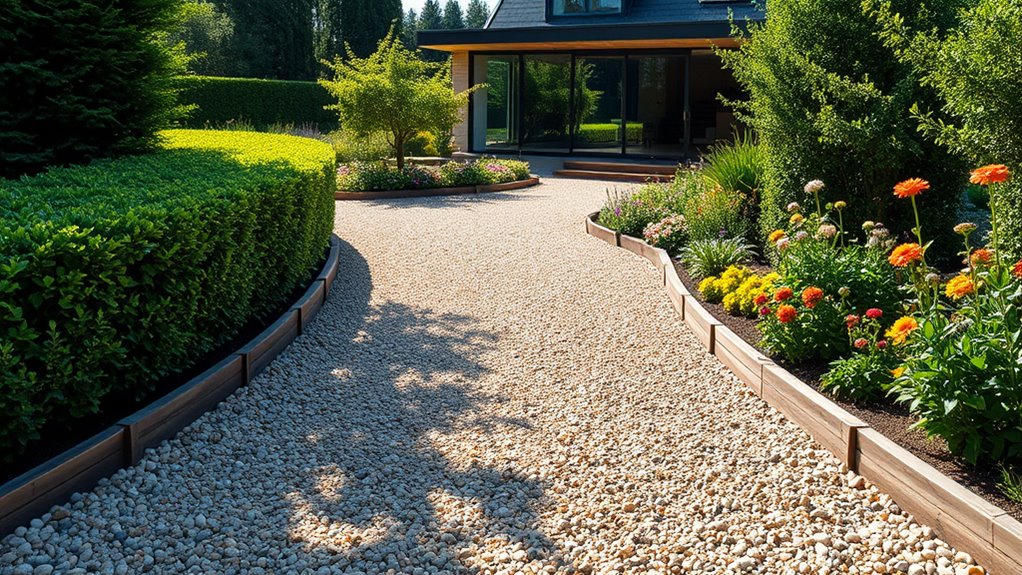
Choosing a driveway goes beyond just practicality; it's also about boosting your home's visual charm. Alternative driveways provide a variety of aesthetic options that can match your style.
- Colour Choices: Select from an array of shades and textures that complement your home's exterior.
- Design Trends: Embrace contemporary patterns like herringbone or opt for rustic materials such as gravel for a distinctive look.
- Personal Touch: Combine materials like stone and grass for a unique and welcoming entrance.
With a bit of creativity, you can enhance your home's curb appeal and showcase your individual taste.
Whether you favour the classic elegance of cobblestones or the modern finish of pavers, alternative driveways can significantly uplift your property's appearance and leave a lasting impression.
Maintenance Requirements for Various Driveways
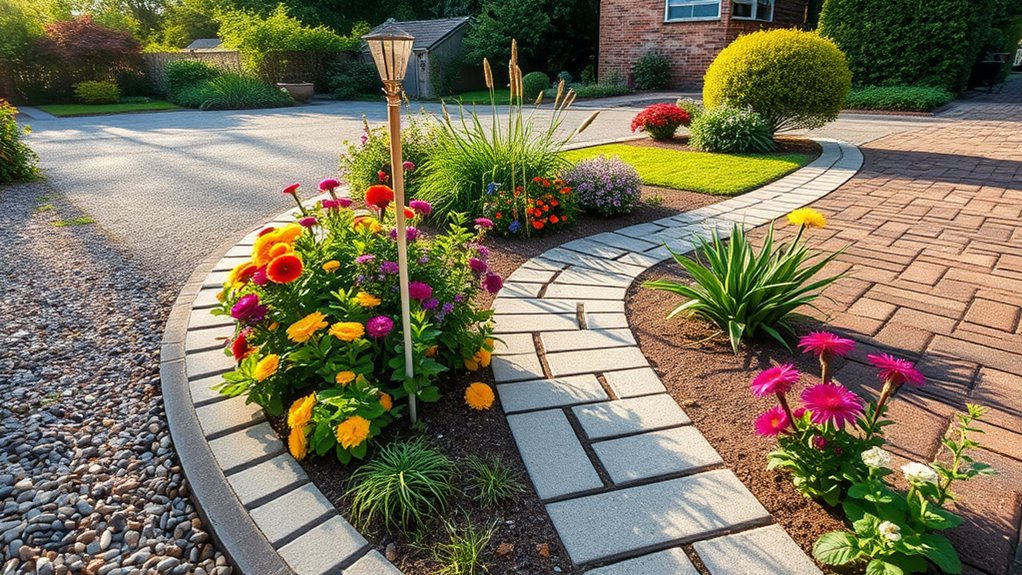
Maintaining your driveway can vary significantly depending on the type you have, such as gravel, brick, or cobblestone.
Gravel driveways need regular raking to keep the surface level.
In contrast, brick driveways require occasional re-pointing to ensure stability.
Cobblestones can be a bit of a challenge, as they tend to shift over time and may need careful resetting to avoid tripping hazards and ensure a smooth drive.
Gravel Driveway Upkeep
Maintaining a gravel driveway is essential for its durability and performance. Here are some straightforward tips for upkeep:
- Regularly rake the surface to keep it level and clear of debris.
- Tackle potholes quickly by removing the damaged gravel and replacing it with fresh material to ensure a smooth surface.
- Top up the gravel as needed to prevent water pooling and ensure effective drainage.
Keeping on top of these tasks will help your gravel driveway last longer and remain functional.
Brick Maintenance Tips
Brick driveways provide a timeless look but require proper maintenance to ensure their durability and functionality. Here are some key tips for keeping your brick driveway in excellent condition:
| Maintenance Task | Description |
|---|---|
| Regular Cleaning | Use a pressure washer to clear away dirt and debris. |
| Joint Sanding | Re-sand the joints every few years to maintain stability. |
| Weed Control | Remove weeds regularly to avoid structural damage. |
Consider sealing your bricks to protect against weather-related wear, though not every driveway needs this. Regular joint maintenance, such as re-sanding, will further bolster stability. A bit of ongoing attention can significantly enhance the charm and lifespan of your driveway.
Cobblestone Care Challenges
Cobblestone driveways offer a charming and rustic look, but they come with specific care challenges that homeowners should consider.
To keep them looking their best, regular maintenance is essential. Here are some key tips for cobblestone upkeep:
- Regular Cleaning: Use water and a stiff brush to remove dirt and debris from the surface.
- Joint Maintenance: Check that the joints between the stones are properly filled to prevent weeds and shifting.
- Repairing Damage: Address any loose stones or cracks without delay to avoid more extensive repairs later on.
While they require some effort to maintain, cobblestone driveways provide a timeless appeal and can enhance your home's value.
With proper care, your cobblestone driveway can remain attractive for years.
Brick Driveways: A Classic Choice
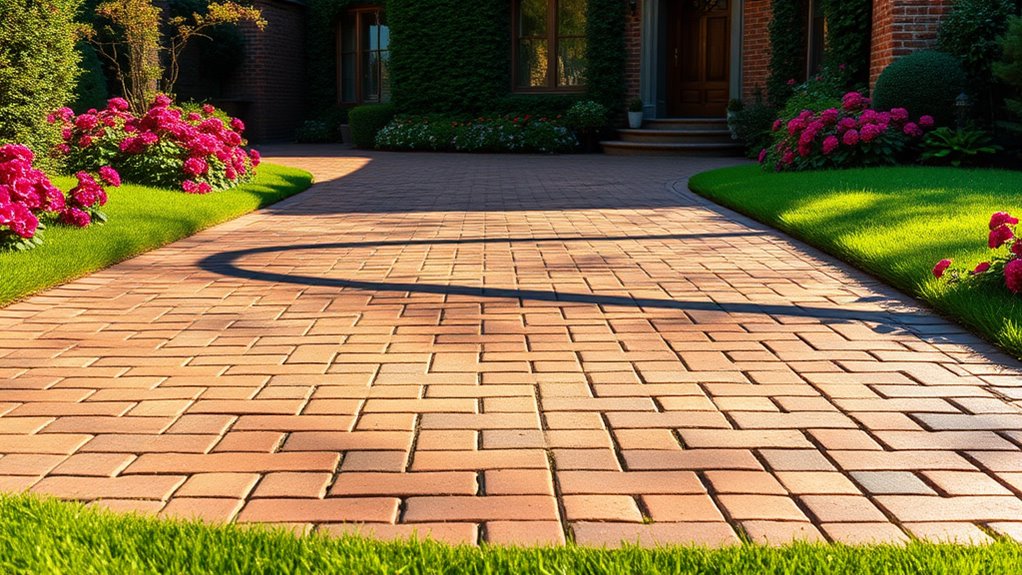
When choosing a driveway, brick driveways are a classic option that combines durability with timeless style. They come in various patterns, allowing you to enhance your home's exterior appeal.
Installation requires a solid sub-base, a layer of fine sand, and careful placement of brick pavers to achieve your desired design.
Brick driveways are often more cost-effective than asphalt and environmentally friendly, as they promote better drainage and reduce runoff.
With proper maintenance, they can withstand significant vehicle traffic for many years. Furthermore, the ability to mix colours and styles ensures your driveway remains attractive over time.
Gravel Driveways: Budget-Friendly Option
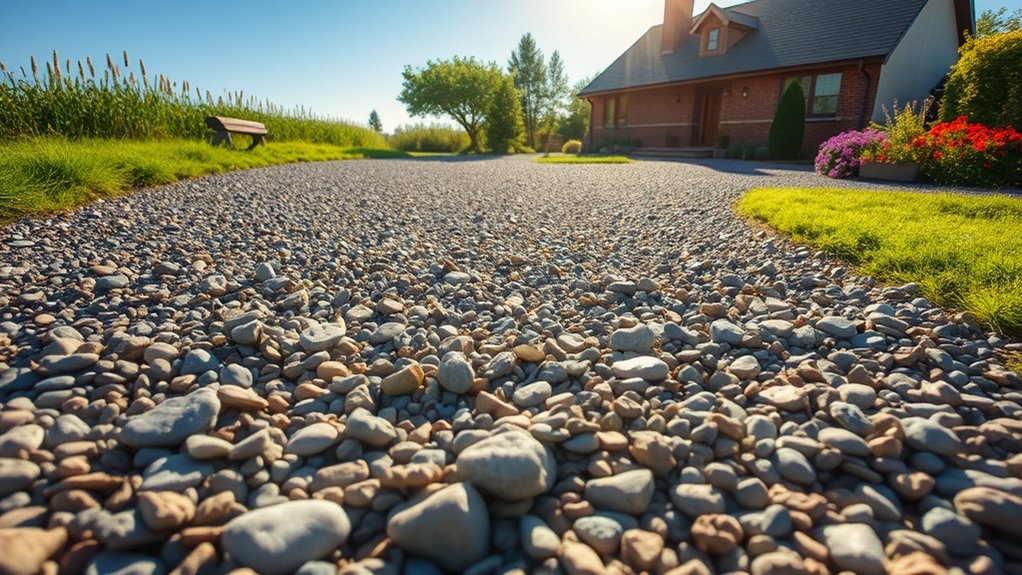
If you're after an affordable way to enhance your property's kerb appeal, a gravel driveway could be the ideal choice. They combine budget-friendly installation with a charming look that can uplift your outdoor space.
Here are some key advantages of opting for gravel:
- Cost-Effective: Gravel driveways are generally cheaper to install than asphalt or concrete.
- Straightforward Installation: Laying gravel requires minimal tools and effort, making it a great option for DIYers.
- Excellent Drainage: Gravel allows water to pass through, which helps prevent puddles and flooding.
With their rustic appeal, gravel driveways can nicely complement your garden.
Just keep in mind that regular maintenance is essential to ensure your driveway remains both functional and attractive for years to come.
Tar and Chip Driveways: Rustic and Cost-Effective
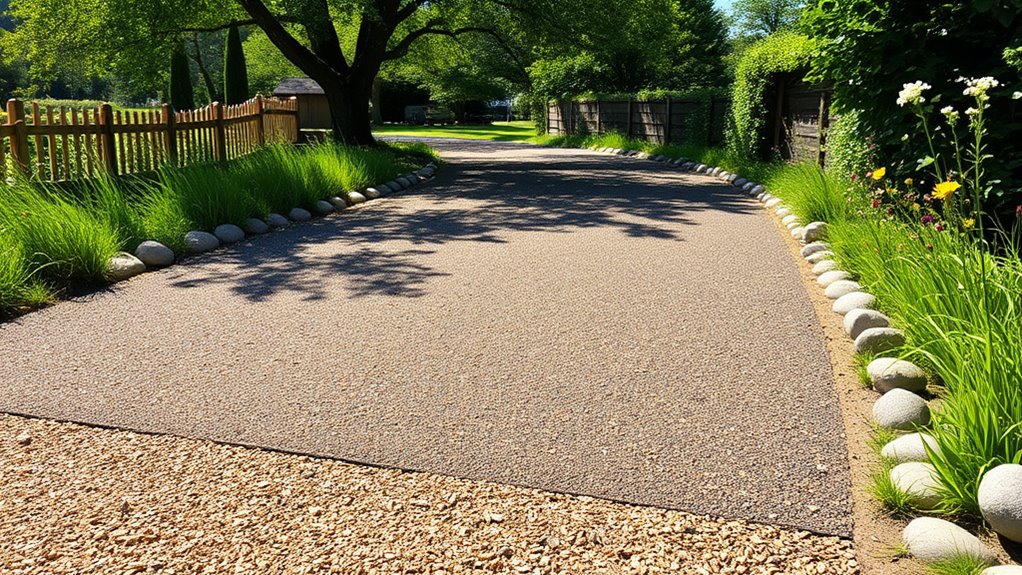
Gravel driveways are a charming and affordable way to enhance your property's appeal. However, if you want something more durable with a rustic finish, consider a tar and chip driveway. This option combines layers of gravel, hot asphalt, and loose stone, providing excellent traction and a unique look.
The installation starts with a gravel base, followed by the application of hot liquid asphalt, onto which loose stone is rolled. This process creates a compact and durable surface.
One of the main benefits of a tar and chip driveway is its low maintenance and cost-effectiveness compared to traditional asphalt. While it may need resurfacing every ten years, its attractive appearance and customisation options make it a practical choice for homeowners seeking durability without excessive costs.
Exploring Cobblestone and Permeable Paver Driveways
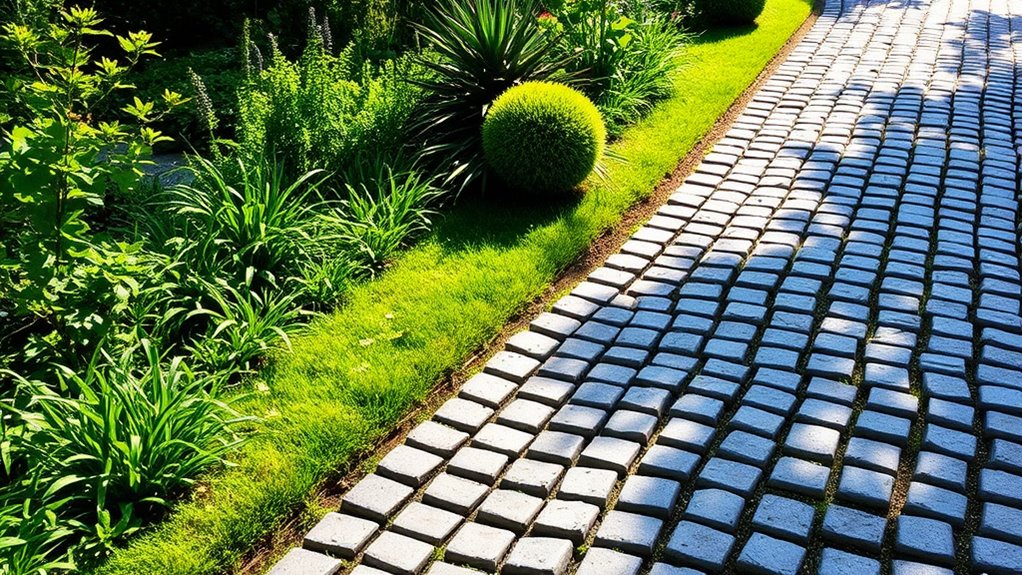
Homeowners often look for driveways that are both functional and visually appealing, and cobblestone and permeable paver driveways offer distinct advantages.
Cobblestone adds charm and character to your property, with a variety of colours and patterns that enhance curb appeal. In contrast, permeable pavers provide notable environmental benefits.
Here are some key advantages:
- Durability: With proper maintenance, both options can last for decades.
- Environmental Impact: Permeable pavers help reduce runoff and promote groundwater recharge.
- Design Flexibility: Cobblestones can be laid out in various patterns to suit your personal style.
Choosing these driveways not only increases your property value but also supports a sustainable landscape, making them excellent alternatives to traditional tarmac.
Frequently Asked Questions
How Do Weather Conditions Affect Driveway Alternatives?
Weather conditions significantly impact driveway alternatives. For example, materials such as brick provide good resistance to the elements, whereas gravel often needs seasonal maintenance to manage erosion. Selecting the appropriate option ensures longevity and reduces the need for upkeep across different weather patterns.
Can I Install a Driveway Myself, or Should I Hire a Professional?
Did you know that nearly 70% of DIY driveway projects end up needing costly repairs? If you lack experience, hiring a professional ensures a quality installation. While doing it yourself might save some money, it also carries the risk of mistakes that could lead to expensive fixes down the line.
What Is the Lifespan of Different Driveway Materials?
When it comes to lifespan, concrete driveways can last between 20 to 50 years, making them a durable option. In contrast, gravel driveways require more upkeep and typically last around 10 to 15 years due to the need for frequent replenishment. Think carefully about your long-term requirements and how much maintenance you're willing to undertake.
Are There Any Local Regulations for Driveway Installation?
Installing a driveway may seem straightforward, but it's crucial to check local regulations first. You need to look into zoning laws and obtain the necessary permits—neglecting this could lead to fines or having to remove the driveway. For instance, if you live in a conservation area, additional rules may apply. Always better to be informed before you start!
How Does Drainage Impact Driveway Selection?
When choosing a driveway, it's essential to think about drainage. Opting for permeable materials can improve water flow, minimise standing water, and lower the risk of erosion, all while helping to recharge groundwater. For example, gravel or permeable block paving can be effective choices. Making informed decisions not only ensures the longevity of your driveway but also provides environmental benefits for your property.
Conclusion
When exploring driveway alternatives, you'll discover options that cater to your budget, style, and environmental concerns. For instance, permeable pavers can cut down stormwater runoff by up to 60%, making them an eco-friendly choice. Whether you prefer the timeless appeal of block paving or the natural look of gravel, each option has its advantages. By considering factors like durability, upkeep, and price, you can choose the ideal driveway solution that meets your needs and enhances your property.
Prepare the perfect base for your resin bound stone installation and discover the crucial factors that ensure lasting durability.
Know where resin bound surfacing can transform spaces for both residential and commercial use, and discover the countless benefits that Read more
A stone carpet combines beauty and resilience in flooring, but what makes quartz floors uniquely beneficial? Discover the secrets behind Read more

